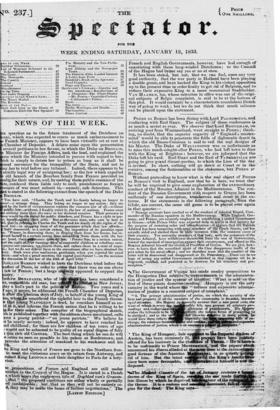NEWS OF THE WEEK.
E 'question ,as to the future 'treatment of the Dutchess DE RRI, which was.expected tocreate so much embarrassment to French Ministty,.appears tO have been virtually set at rest in Chamber of Deputies. A delete excise upon -..the presentation several petitions imher favour; in which the Duke DE BROGLIE, Minister for Foreign Affairs; took the lead, and explained the re which the Ministry intended to pursue with regard to her; Inch is simply to detain her in-'prison as long as' it shall be Ifemed• netessary for the tranquillity of the State; and 'not to ng her to trial before any tribunal.- Indeed, there appears to be strictly legal way of arraigning hot; as the law which expelled ol,d branch of the Bourbon family from France provide.d no, altfer their return, and, by making theta public enemies of the te,:reridered them liable only to such punishment as foreign soners of war must subrait:to,--nainely, safe detention. This
is 'stated in the following extract from the speech of the Duke BROGLIE.
You have said, 'Charles the Tenth and his family belong no longer to nceL-a-sgapge thing. They belong no longer to any nation: they are ed by the toree a circumstances without the common law of all—without public., law-,...svi,thon4 Lfiankly aseeit it, the law of nations: - France owes O. would beg* - al for publicdi.4erders„ and -France has a right to Pre- nothing., more t4ne she oWes to her declared enemies. Their presents in e 1,0,E, -40. A,ej h :eirils. - Butat--the:same time,: take care to bear in (I, &l.iqt3o,ret.*. Charles the Tenth and &tidily all the rights of the ral law—in Stripping them of all the guarantee which that law affords= " iertonneid, to a Certain extent, the imposition of its penalties upon (Fiance, in disowning them; in .ffingipe thein horn her bosom , has in- tad herself to a:certain exte.ntral4oiderustta frotn-them, with the law er ;bend, thei.::410tilinents -t1trih.4-lieli: :FrItrioilids; to 'a certain extent, ed the,riglitgriii treating ihiniukungrateful children or rebellious sons. pursue ourmunnies„ waidisartn them, and reduce -them to a state of impo-. e; but weslo not deliver thern to the executioner after we have obtained the °Ff.. Stich were yhur Sentiments, gentleinen, *ben you rejected the penal run—and what a penal sanction; the capital innishment i.—on the occasion e disciissian id' the law of the .10th of April 1832." . nt-LL:0/4:BARA97. wished to have the Dutchess tried before the mber of Peers', in order to prOnt.hat there was no one above kV in Fiance; but a large pent/ appeared to support the ist,t"f• --' '`
[
139EPH BetNAPARTE, Who of I ' . ' . • been. considered a t,-re4ectAble old min; has q, __ Li ' -hi New Jersey, lay a fool's part in the polititittit lktiope. -Two years and a ago, it seems, .he addressed the Chamber of Deputies;
after thellormus days ofJuly; in behalf of the young King of ep.who*.e considered the rightful heir to-the French throne.
that iiting NAPOLEON is dead, lie considers himself as en- 11;t5. it. and informs (lie French natien that he is willing to be g.ifOr their sakes. ; The compiler of the biographical sketch, ch is published together with the address above mentioned, calls EI‘11 a yOung patriot—" on -jeune patriote." We believe he it be nearly seventy: indeed, he appears to have reached his ind-childhood; for there are few Children . of ten years of age i waald-not be asliatited,to beguiltyif an equal degree of folly i this-rjch 0,4, Corsican. ., The best thing which he can do will o retire as seon_as, possible to his ;pahme at Bordentown; and provoke the attention ofi mankind .to his weakness and his
ittt- - ,' ' - • ' : .. :_., .: . .. . a ... - . ' .
he• King and Queen of France are gone to the Northern fron- t9 meet the victorious army. on -its rerun' from Antwerp; and induct King LEOPOLD and theirdaughter "to Paris for a holy-


















